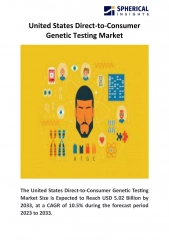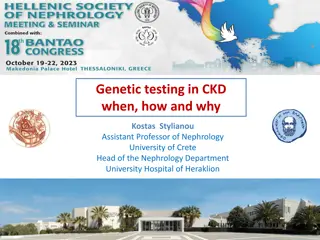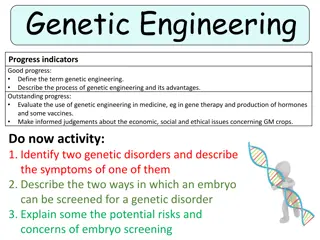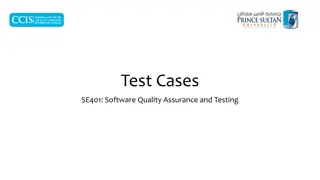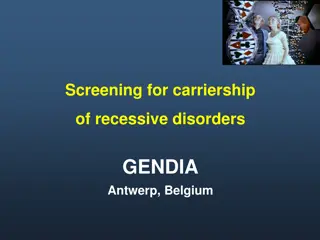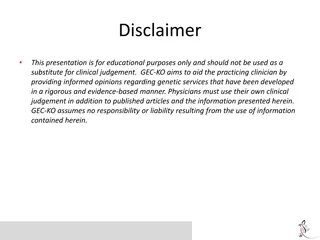Understanding Direct-to-Consumer Genetic Testing: Cases and Considerations
Explore real-life scenarios of individuals opting for Direct-to-Consumer Genetic Testing (DTC-GT) to assess genetic risk for various health conditions. Consider the implications, limitations, and cautions associated with DTC-GT, highlighting the importance of comprehensive evaluation and genetic counseling in making informed decisions.
Uploaded on Sep 08, 2024 | 0 Views
Download Presentation

Please find below an Image/Link to download the presentation.
The content on the website is provided AS IS for your information and personal use only. It may not be sold, licensed, or shared on other websites without obtaining consent from the author. Download presentation by click this link. If you encounter any issues during the download, it is possible that the publisher has removed the file from their server.
E N D
Presentation Transcript
Direct-to-Consumer Genetic Testing Developed by Ms. Shawna Morrison, Dr. June Carroll, and Dr. Judith Allanson Last updated May 2016
Disclaimer This presentation is for educational purposes only and should not be used as a substitute for clinical judgement. GEC-KO aims to aid the practicing clinician by providing informed opinions regarding genetic services that have been developed in a rigorous and evidence-based manner. Physicians must use their own clinical judgement in addition to published articles and the information presented herein. GEC-KO assumes no responsibility or liability resulting from the use of information contained herein.
Objectives Following this session the learner will be able to: Discuss and address patient concerns regarding direct-to-consumer genetic testing (DTC-GT) Find high quality genomics educational resources appropriate for primary care
Pearls Direct-to-consumer (DTC) genetic testing is over-the-counter genetic testing available online to consumers through private companies Generally, results report an individual s probabilistic risk to develop a medical condition based on genome wide association studies (GWAS) Interpret DTC results with caution Family health history-based risk assessment is still the gold standard in initial assessment for heritable conditions
Case 1: Jenny 33 years old and in good health 6 months ago she learned that her paternal aunt, who is dying from ovarian cancer, was found to carry a mutation in the BRCA1 gene + BRCA1 pos She didn t feel this was the best time to approach the family to inquire further, so she purchased a DTC-GT kit online which tests the BRCA1 gene with the hope of being proactive, like Angelina Jolie
Case 2: Clark 50 years old and in good health d.85 d.87 MI 90 86 75 88 80 AD dx 80 arthritis IDDM 50 A&W Recently purchased a DTC-GT kit out of curiosity after reading a news article
Case 3: Jane 45 years old, in good health Began experiencing low mood about 3 months ago She has been seeing a therapist but having a hard time with day-to-day and meets criteria for depression You plan to prescribe Citalopram as you usually have success treating patients with this medication Last year she had pharmacogenomic testing through a private lab
What is direct-to-consumer genetic testing? Direct-to-consumer genetic testing (DTC-GT), also referred to as personal genome testing, refers to genetic testing available for over-the- counter purchase without health care provider involvement. without
What is direct-to-consumer genetic testing? Generally, available online to anyone for a cost Usually performed on a saliva sample
What does direct-to-consumer genetic testing test for? Hereditary breast and ovarian cancer caused by mutations in BRCA1 and BRCA2 Complex health conditions/ Genetic risk factors Asthma Alzheimer disease Diabetes Hypertrophic cardiomyopathy
What does direct-to-consumer genetic testing test for? Complex health conditions/ Genetic risk factors Clopidogrel Simvastatin Pharmacogenomics Codeine Pantoprazole Citalopram Phenytoin
What does direct-to-consumer genetic testing test for? Complex health conditions/ Genetic risk factors Cystic fibrosis Pharmacogenomics MCAD Inherited conditions i.e. carrier testing PKU Tay Sachs disease Canavan disease -thalassemia
What does direct-to-consumer genetic testing test for? Complex health conditions/ Genetic risk factors Pharmacogenomics Inherited conditions i.e. carrier testing Curly hair Eye colour Height Bitter taste Traits Cilantro aversion
How does direct-to-consumer genetic testing work? Complex health conditions/ Genetic risk factors Uses data from Genome Wide Association Studies (GWAS) Pharmacogenomics Inherited conditions i.e. carrier testing Traits
How does direct-to-consumer genetic testing work? Complex health conditions/ Genetic risk factors Genome Wide Association Studies (GWAS) Pharmacogenomics Case-control studies which examine Single Nucleotide Polymorphisms [SNPs] Traits Each SNP represents a difference in a single DNA building block, a nucleotide
How does direct-to-consumer genetic testing work? Complex health conditions/ Genetic risk factors Genome Wide Association Studies (GWAS) Pharmacogenomics Compare large groups of individuals Traits Pathogenic, disease- causing/predisposing changes Non-harmful changes VS 2. Individuals with symptoms of a specific disease 1. Unaffected controls
What do direct-to-consumer genetic test results mean? Complex health conditions/ Genetic risk factors Results Pharmacogenomics Low risk Traits Lower than average Average risk Population risk High risk Higher than average Increased risk
What do direct-to-consumer genetic test results mean? Complex health conditions/ Genetic risk factors Results Pharmacogenomics Assess the kinetics and dynamics of specific drugs Traits Aim to: Avoid adverse effects Improve efficiency Genotype associated with increased risk of adverse effects For example Genotype associated with decreased therapeutic benefit
What do direct-to-consumer genetic test results mean? Common gene mutations, generally ethnicity based Complex health conditions/ Genetic risk factors BRCA1 and BRCA2 3 Ashkenazi Jewish founder mutations (common mutations in a population arising from a small number of individuals) are generally offered Over 3800 mutations have been identified in BRCA1 and BRCA2 Pharmacogenomics Inherited conditions i.e. carrier testing CFTR (mutations in this gene cause cystic fibrosis) Traits A core panel of 23 mutations is generally offered vs over 70 mutations at most clinical labs
What do direct-to-consumer genetic test results mean? Do not take into account numerous important factors that are a significant contribution to common complex disease in interpretation Family history Age Lifestyle (e.g. smoking obesity) Other environmental factors Different companies use different GWAS reports and different SNPs for analysis
Potential Risks/Benefits/Limitations Patient autonomy Encourage positive behaviour modifications (e.g. increase exercise, smoking cessation) Information for medication choice and/or dose Information for individuals who have no or limited information about their family history (e.g. an individual who was adopted) Reveal carrier status of a genetic condition that could have implications for family planning or medical management Potential Risks/Limitations Potential Benefits
Potential Risks/Benefits/Limitations Recent meta-analysis (Holland2016 BMJ) found no significant effect of communicating DNA based risk estimates on several health behaviours Limited data to support the clinical validity (ability to predict clinical outcome) and utility (the likelihood of improving patient outcome) Discrepant results between companies, different studies may be used for result interpretation (Kalf 2013 Genet Med) Truth in advertising (potential for consumers to be misled about the benefits versus risks and limitations) Privacy and Regulation How much is your genome worth? Potential Risks/Limitations Potential Benefits
Potential Risks/Benefits/Limitations Concerns re downstream testing and costs as result of direct-to- consumer genetic test (DTC-GT) results Limited data: One study showed DTC-GT results seem not to be associated with an overall increase in health care utilization (Reid 2012 Genet Med) Recent study reported that 63% of customers planned to share DTC-GT results with PCP, at 6 month follow-up 27% had done so and 35% were very satisfied with the encounter, 18% not at all satisfied (van der Wouden 2016 Ann Intern Med) Several other studies report that more than a quarter of customers shared DTC-GT results with their PCP Potential Risks/Limitations Potential Benefits
Potential Risks/Benefits/Limitations Misattributed equivalence DTC-GT reports test indicates a lower than average lifetime risk for condition A Family history (FH) indicates a higher than average risk for condition A Could lead to: False reassurance Less vigilance about medical interventions indicated by FH Potential Risks/Limitations Potential Benefits
Case 1: Jenny She receives her results and tells you that she is very relieved because she does not have a mutation in BRCA1 BRCA1 pos What are your next steps? Review the report DTC-GT testing companies generally only screen for a few founder mutations Need to confirm that Jenny was tested for the familial mutation still need the familial mutation report If she truly is negative for the familial mutation, this is reassuring, should still confirm result in a clinical lab
d.85 d.87 Case 2: Clark MI Purchased DTC for curiosity 90 86 75 88 80 AD dx 80 arthritis IDDM He brings in his laptop to show you his results 50 A&W He is distraught to learn that he has an increased genetic risk for Alzheimer disease, he had thought that he could stave off the disease by healthy lifestyle choices
How can you counsel Clark? APOE is a susceptibility gene and is not a predictive test With a first-degree relative with AD, even individuals with no copies of the 4 allele still face [about a 2x] increased lifetime risk Regardless of his DTC result, based on Clark s family history, his AD risk is about 20-25% because his mother was affected He should still continue with his healthy lifestyle as AD develops from a complex interaction between genetic and environmental factors
Case 3: Jane She brought her pharmacogenomic testing to you to add to her medical record It had never been useful as Jane is healthy and has not been prescribed anything in the last 2 years You revisit the report
What action can you take? Jane s report reveals a variant that means she is an ultrarapid metabolizer of medications that are catalyzed by CYP2C19, such as citalopram
What action can you take? Jane s report reveals a variant that means she is an ultrarapid metabolizer of medications that are catalyzed by CYP2C19, such as citalopram As a result, she could be at increased risk of pharmacotherapy failure with this medication You consider alternative medications which are metabolized by other CYP enzymes, such as fluoxetine (CYP2D6 and CYP2C9 ) or venlafaxine (CYP2D6)
Resources GEC-KO on the run and other resources at www.GeneticsEducation.ca Direct-to-Consumer genetic testing Hereditary breast and ovarian cancer Alzheimer disease Aiyar L, Shuman C, Hayeems R et al. Risk estimates for complex disorders: comparing personal genome testing and family history. Genet Med 2014; 16(3):231-7 Heald B, Edelman E, Eng C. Prospective comparison of family medical history with personal genome screening for risk assessment of common cancers. Eur J Hum Genet 2012; 20(5):547-51 Hollands GJ, French DP, Griffin SJ, et al. The impact of communicating genetic risks of disease on risk-reducing health behaviour: systematic review with meta-analysis. BMJ 2016;352:i1102 Kalf RR, Mihaescu R, Kundu S, et al. Variations in predicted risks in personal genome testing for common complex diseases. Genet Med 2014;16(1):85-91 van der Wouden CH, Carere DA, Maitland-van der Zee AH, et al. Consumer Perceptions of Interactions With Primary Care Providers After Direct-to-Consumer Personal Genomic Testing. Ann Intern Med 2016;164(8):513-22 Reid RJ, McBride CM, Alford SH, Price C, et al. Association between health-service use and multiplex genetic testing. Genet Med. 2012 Oct;14(10):852-9 Roberts JS, Ostergren J. Direct-to-Consumer Genetic Testing and Personal Genomics Services: A Review of Recent Empirical Studies. Curr Genet Med Rep 20131(3):182-200 Skirton H, Goldsmith L, Jackson L, O Connor A. Direct to consumer genetic testing: a systematic review of position statements, policies and recommendations. Clin Genet 2012; 82(3):210-8


